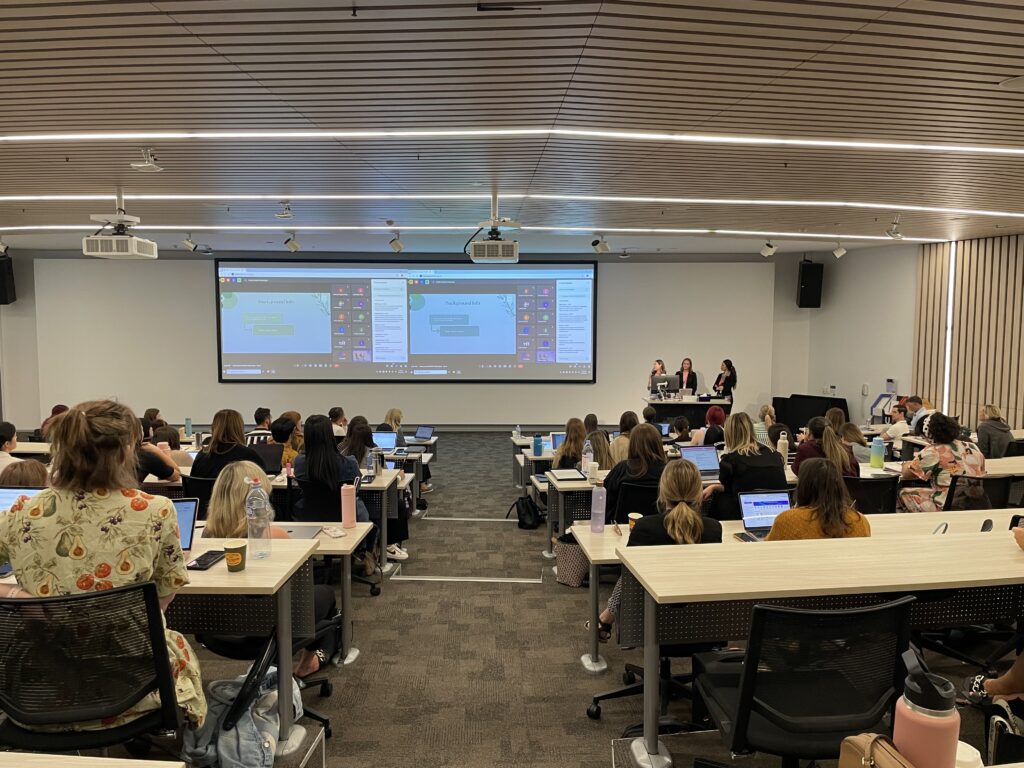Reflections on Presenting a Case Review at Advanced PFA/SBT Workshop: Being a Scientist-Practitioner!

Mia Andrade
SENIOR BEHAVIOUR TECHNICIAN

I had the privilege of presenting a case review at the Advanced Practical Functional Assessment & Skill-Based Treatment (PFA/SBT) workshop with Dr. Greg Hanley. This two day workshop was hosted by Super Kids and brought together Australian professionals in the field of Applied Behaviour Analysis to exchange knowledge, share effective strategies, and discuss complex cases with other experts. The workshop provided a valuable space for collaboration, feedback, and problem solving among experts in the field.
The workshop focused on helping clinicians enhance their knowledge of the PFA/SBT process, with an emphasis on real-life applications through case reviews. The case reviews, including our own, provided a hands-on look at the PFA/SBT process and demonstrated how it may need to be adapted for individual learners dependent on data analysis and process. Seeing examples from others, further reinforced the importance of collaboration and problem solving among experts in our field, to produce more effective outcomes during implementation.
On day two, I contributed to the clinical case reviews. For my case review, I presented with Tina Nguyen and Natasha Augusta on the importance of being a scientist-practitioner, reminding the audience that the PFA/SBT process can be adapted based on the child’s needs, careful data review, and individualised treatment. Throughout the presentation, we discussed the clinical background of the case, the specific goals set, and the step by step interventions applied across different settings, such as preschool and clinic environments. Natasha and I shared the outcomes of the intervention, sharing that before starting, the learner avoided group activities, adult-led instructions, social interactions, and leisure activities. After PFA/SBT implementation, the learner began actively seeking peer interactions and engaging in craft and leisure activities with enjoyment, demonstrating the importance of adapting the process when needed and applying the role of a scientist practitioner.
Dr. Erin Leif humorously reinforced the idea of being a science practitioner by saying, ‘it’s a good reminder to not be too dogmatic or too married to, I do it “the Hanley Way” and rather, no, you do with the behavior analyst’s way, which is you personalize it for your learner and you let the data tell the story and then you let the learner go. She said
“..you reminded us all the importance of thinking like a behavior analyst, and understanding behavioral principles at play that are sitting under the interventions and strategies that we use. And it’s a good reminder to not be too dogmatic or too married to,” I do it the Hanley way” and rather, no, you do with the behavior analysts way, which is you personalize it for your learner and you let the data tell the story and then you let the learner go.. [then you] can help you jump and step ahead, rather than being too rigid.”
She later added, ‘The Greg Hanley way is indeed the science way,’. Her comment brought laughter to the room, highlighting the importance of thoughtfully adapting methods. This shows the importance of applying evidence-based practices when working with individuals with specific needs. Engagement from the audience was high and they showed curiosity about how we adapted the procedure for this particular learner, increasing the sense of collaboration and shared passion for the best practice implementation of PFA/SBT.
Presenting this case offered me the opportunity to connect and collaborate with other professionals who are experts in researching the applications of Behaviour Analysis. It allowed me to improve my public speaking skills and gain confidence in disseminating important information. Connecting with others in the field and hearing their questions was empowering. It was inspiring to see such high levels of passion and best practices from everyone in attendance.
To conclude, the opportunity to participate in the PFA/SBT workshop was an incredible experience, which helped aid my clinical approach and reinforced the importance of collaborating with other enthusiastic professionals. I’m excited to incorporate these insights and am eager to connect, learn and team up with the community in future workshops.

Reflection summary
1.)Importance of collaboration within the field:
The workshop provided opportunities for networking, problem solving and enhancing our knowledge around the SBT/PFA process. Through discussions on real-life case reviews, the importance of collaboration and gaining insight from other practitioners was clear. Having the chance to receive feedback and brainstorm with fellow practitioners, helps us work towards better outcomes and treatment applications for our clients.
2.)Being a Science Practitioner: Throughout the workshop, a recurring theme was the idea of being a science-practitioner. This refers to practitioners who ground their work in science and practical research (Malott, 2018.) Thoughtfully adapting procedures and making data informed decisions allows us to have more meaningful outcomes for our learners.
3.) Individualisation of treatment: Dr. Gregory Hanley acknowledged the importance of gathering information from those closest to the learner through open-ended interviews. He described how caregiver input can provide important insights into the learner that might otherwise be missed. Using this information helps create a more individualised treatment plan, creating a more well-rounded understanding of the client.
Super Kids acknowledges each individual’s personal preference to use identity-first or person-first language to describe themselves or their loved one. We interchangeably use both language conventions and therefore refer to both Autistic children and children with Autism.






